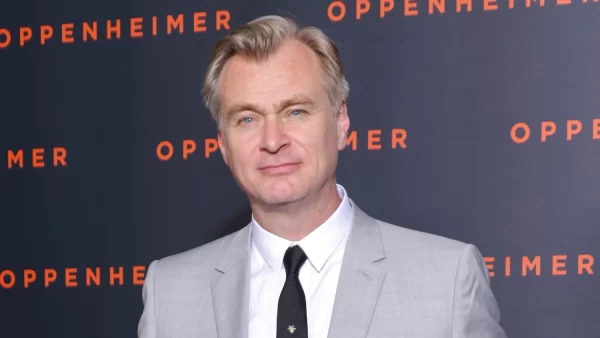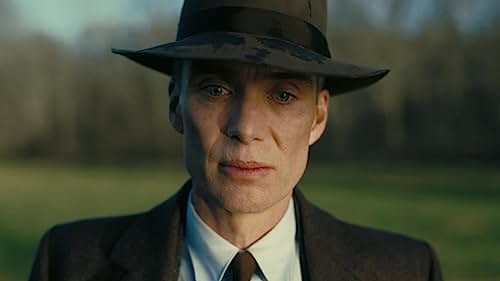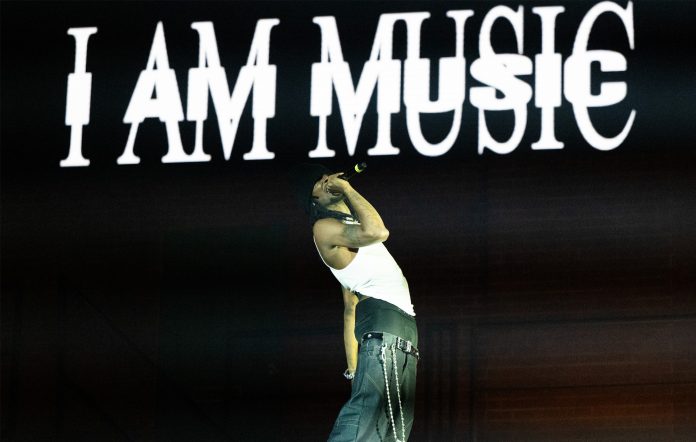Every film should be seen with an open mind, but sometimes it is easier said than done. I walked into an opening-day screening of Christopher Nolan’s Oppenheimer filled with preconceived notions and prejudice. I sat in my seat, arms crossed, eyes peering at the screen, not watching but judging everything projected before me. It is nothing I am proud of, but it is the truth progressed, it slowly drew me in closer and closer. By the time the credits rolled, I was entirely gripped. The very next day, I saw it again and I loved every minute. Rather than getting carried away playing in his sci-fi sandbox again, Nolan tethers himself to reality and focuses his lens on one man, J. Robert Oppenheimer, the creator of the atomic bomb, and in turn, is a tour de force of drama and his finest film to date.
Sidestepping the typical and bland point-A-to-point-B biopic structure, Oppenheimer interweaves two narratives of Oppenheimer’s (Cillian Murphy) life. One of which is the period of his life before the atomic bomb, from his time as a college student studying physics overseas to becoming a professor at The University of California, Berkeley, revered for his brilliance in his field. Via his brother Frank (Dylan Arnold), a member of the party, Oppenheimer frequents communist circles where he meets his wife Katherine (Emily Blunt) and his mistress Jean Tatlock (Florence Pugh). Though he never officially joins, his Communist ties are a non-omittable part of his past. His rising influence in Quantum Physics brings Army General Leslie Groves (Matt Damon) to his lecture hall doorstep to offer him the role as the director of the highly-secretive Manhattan Project, a United States Army effort to create nuclear weaponry before Nazi Germany can through a secret city in Los Alamos, New Mexico.
Oppenheimer accepts and three-billion dollars, three years, and thousands of scientists later, the atomic bomb nears completion. Concerns regarding its use come to the fore. What are the long-term consequences of introducing to the world a weapon of mass genocide at the press of a button? Can the United States be trusted with such power? One thing is certain: the Nazis cannot. As a Jewish man, that is a reminder that keeps Oppenheimer at bay.
The second narrative of Oppenheimer is the period of his life after the atomic bomb, though mostly concentrated on four eventful weeks in 1954. On the heels of the atomic bomb’s success, Oppenheimer advises its future use as a part of the newly formed Atomic Energy Commission led by Lewis Strauss (Robert Downey Jr). Despite an intensifying arms race with the Soviet Union, Oppenheimer takes a strong stance for denuclearization and prevention of further development of the Hydrogen bomb, speculated to be 1,000x more powerful than the atomic bomb. The combination of Oppenheimer’s increasing pacifism, his communist past, and the discovery of communist spies at Los Alamos puts a target on his back. He is accused of disloyalty to the United States, and a four-week courtroom hearing to remove him from the AEC and revoke his national security clearance ensues. Both his professional and personal lives are put under scrutiny and skeletons are dragged out of his closet. Alongside damning evidence from the FBI’s case file on Oppenheimer, a plethora of members of his past are called to testify. Expressed through Cillian Murphy’s thousand-yard stares, the stress of the hostile court case coupled with the weight of Hiroshima and Nagasaki on his shoulders begin to create a claustrophobic kind of stress, eating away at Oppenheimer. This isn’t Murphy’s first time working with Nolan, this is their sixth collaboration. But unlike the minimal parts he had been handed before, with Oppenheimer, Nolan gives Murphy the reins of the leading role and he delivers one of the most fascinating performances of the decade thus far, completely drawing you into Oppenheimer’s psyche.

As early as his first feature film Following (1998), Nolan has had a knack for non-linear storytelling. More often than not, it has only muddled his work. On this occasion, however, Nolan’s intuitions as a filmmaker serve him greatly. The juxtaposition of Oppenheimer’s approaching completion of the bomb beside the haunting guilt on the horizon gives Oppenheimer’s first two acts a feeling of impending doom and slow burn. With its intriguing flash-forwards to courtroom drama, Nolan instills Oppenheimer’s exposition, an area of weakness for many biopics, with conflict out of the gates, keeping all of its 180 minutes engaging.
The two storylines meet ends near the middle of the film during the Manhattan Project’s ‘Trinity’ test, the first-ever detonation of a nuclear weapon. The moments leading up are chaotic. Years of work now lie in a 10-foot-tall atomic warhead that will either successfully detonate or collapse across the desert. Both General Groves and Oppenheimer bear their reputations on the line. A big storm delays the 4:00 AM drop time. When it passes, the timer to the detonation begins. Everyone gets in formation. Ludwig Göransson’s intense score booms as loud as ever. The timer hits zero, the button is pressed, and then everything goes silent. I could have heard a pin drop in the theater. Then, an overpowering flash of light fills the desert, and a behemoth of flame and explosion appears in the sky. The vivid image is not matched by a loud boom, light travels faster than sound. Instead, we only hear the astonished breaths of its observers. Oppenheimer, light illuminating his face, slowly takes off his goggles and watches with widened eyes and an opened mouth. The nature of Cillian Murphy’s expression is ambiguous, but you can feel a culmination of multiple emotions; shock, fascination, fear. It is the point of no return.
The atomic bomb is not used on Nazi Germany but on the Japanese cities of Hiroshima and Nagasaki, two key cities of the remaining Axis power. Hundreds of thousands of Japanese soldiers and civilians alike are killed. WWII is effectively over. The US soldiers come home. By its own standards, the Manhattan Project is a striking success and Oppenheimer is a war hero. He goes on a proud American victory lap. He tells the people what they want to hear, he stars on the cover of Time Magazine, and he takes photo-ops with ear-to-ear smiles. But within, he is registering a grave mistake. As Oppenheimer is face to face with the consequences and implications of his creation, he is hit by a paralyzing wave of guilt and regret, illustrated by Nolan with nightmarish PTSD-induced visions that are better experienced than I could ever explain to you.

When it was merely a theory, Oppenheimer could rationalize the atomic bomb, but now in reality, it terrifies him. How could anyone swallow the pill that their entire life’s work is the cause of such atrocity?
Throughout the film’s final act, the courtroom drama intertwined with the first two acts unfolds. Oppenheimer is ruthlessly grilled and he does not care to put up a fight. His fate is sealed.
In the beginning, we see AEC Chairman Lewis Strauss as bipartisan. Later, his orchestration of Oppenheimer’s crucifixion from behind the curtains becomes clear. Strauss, a career-highlight performance for Robert Downey Jr, acts with a calculated and poker-faced malice. He is fueled by disagreement, resentment, and jealousy, both professionally and personally. Oppenheimer is far separated from the earnest world of physics, he has become a pawn in a snakey political game.
Oppenheimer’s security clearance is revoked by a 4 to 1 vote and his reputation is tarnished. He is chewed up and spit out by the country he has served. Strauss walks unscathed and unchecked
Five years later, when Strauss is nominated by President Eisenhower as the Secretary of Commerce, he is subject to a Senate confirmation hearing. Halfway out the door with his most powerful position yet, physicist David Hill (Rami Malek) is called to testify to Strauss’s character. It is here where Hill blows the lid on Strauss’s first-hand sabotage of Oppenheimer’s public image. Strauss’s ugly and vindictive character is exposed and his cabinet bid is rejected. His political career lies in ruins. In destroying Oppenheimer, he wound up destroying himself. For a moment, we feel satisfied, but in the end, it hardly matters. Oppenheimer’s existential dread remains as prevalent as ever.
For nearly all of Oppenheimer, we see the man’s life through his lens. We feel sympathy for him. We view him as a tragic figure and a martyr. Throughout Oppenheimer, Nolan shifts from in-color to black-and-white to differentiate what is Oppenheimer’s subjective experience and what is concrete reality. For much of the runtime, the stylistic choice feels futile until a late-game scene that shifts Oppenheimer’s entire perspective. After his ploy blows up in his face, Strauss, in black-and-white, begins on a rant about Oppenheimer’s moral character.
As I saw it through the black-and-white lens of Strauss’s monologue, I began to rethink everything I thought I had understood about Oppenheimer. He had countless opportunities to turn away from the project. On multiple occasions, he shunned petitions and movements amongst physicists to withhold use of the atomic bomb. He made his bed and tucked himself in. Who is he to turn around and try to recontain the power he unleashed to the world? It is one big mess of morality. By the end, we hardly know exactly how Oppenheimer feels. Not even Oppenheimer knows how Oppenheimer feels. As the credits rolled, I was overcome with a strong sense of melancholy.
Oppenheimer begins with a quote from Ancient Greek mythology.
“Prometheus stole fire from the gods and gave it to man.
For this he was chained to a rock and tortured…”
Oppenheimer will be tortured by his actions for eternity.














